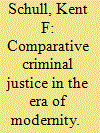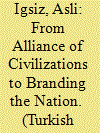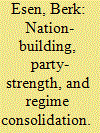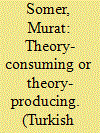|
|
|
Sort Order |
|
|
|
Items / Page
|
|
|
|
|
|
|
| Srl | Item |
| 1 |
ID:
135845


|
|
|
|
|
| Summary/Abstract |
This article lays out the broad transformations within the Ottoman criminal justice system over the course of the nineteenth century in order to demonstrate how the empire transformed its long-standing methods and approaches to criminal justice by adapting “modern” concepts and practices. In the end, it created an integrated system of justice that included new penal codes, police, courts, and corrections, thus demonstrating both its unique characteristics and its comparability with contemporary states. This article first discusses the problematic, but indispensable concept of modernity and how it has hindered comparative empire studies for the long nineteenth century. It then argues for an eclectic approach to comparative empire that adopts the concept of “improvisational blending” to understanding modernity and utilizes intermediate units of analysis in promoting the study of comparative empires. Finally, this article takes the transformation of the Ottoman criminal justice system during the late nineteenth and early twentieth centuries as an intermediate unit of analysis to illustrate a unique Ottoman modernity that is fully comparative on the trans-imperial level.
|
|
|
|
|
|
|
|
|
|
|
|
|
|
|
|
| 2 |
ID:
135850


|
|
|
|
|
| Summary/Abstract |
In 2005, the United Nations launched the Alliance of Civilizations initiative, co-sponsored by the Spanish and Turkish governments, to address issues raised by “Clash of Civilizations” discourses in the aftermath of 9/11. In 2006, a series of “rebranding” initiatives were launched during the World Economic Forum meetings to repair the image of the Middle East and to propose Turkey as a “bridge between civilizations.” In this process, certain categories (e.g. civilization and the East/West) have informed the terms of relevance in these projects. This article engages these initiatives as politics of comparison—that is, comparison as a state-sponsored project to (re)position a state in a world order and to secure power. Such projects of comparison are important factors to consider the politics of positioning a nation state, and the categories that inform such alignments. In that light, this essay addresses the implications of such political projects for the production of knowledge in general, the dynamics of “relevance” related to Turkish Studies in the USA in particular.
|
|
|
|
|
|
|
|
|
|
|
|
|
|
|
|
| 3 |
ID:
135848


|
|
|
|
|
| Summary/Abstract |
The growth of interdisciplinary work in Turkish Studies has increased the likelihood that the findings will reach an audience in the academic world beyond those specializing in Turkey's history, politics, and society. Clientelism and patronage represent genuinely interdisciplinary concepts and they have been used widely in the social sciences and humanities. The main purpose of this paper is to assess the contribution of clientelism and patronage to the interdisciplinary approaches in Turkish Studies, with special emphasis on the origins and growth of party politics in Turkey. Since the mid-1970s, there have been two major research waves on political clientelism in Turkey. While the main focus of the early studies was on traditional patron–client relations in the provincial small-towns and villages, recent research has been primarily concerned with clientelistic networks and patronage distribution among the urban poor in the low-income districts of the major cities, especially Istanbul. Programmatic appeals, popularity of the leaders, and the management of the economy are important in shaping the preferences of the voters in Turkey. But an equally important factor is the distribution of goods and services in exchange for votes through political clientelism and patronage.
|
|
|
|
|
|
|
|
|
|
|
|
|
|
|
|
| 4 |
ID:
135843


|
|
|
|
|
| Summary/Abstract |
Comparative studies developed late in the field of Ottoman and Turkish history and, when they did, that was due primarily to external influences: the impact of world system theory, the flowering of nationalism studies and the growth of empire studies that was triggered by the fall of the Soviet Union. The comparative methodologies employed have become progressively more sophisticated and because historians of the Ottoman Empire and Turkey are now increasingly asking “big” questions, they are able to use their empirical knowledge to contribute to broader debates and influence theoretical development.
|
|
|
|
|
|
|
|
|
|
|
|
|
|
|
|
| 5 |
ID:
135844


|
|
|
|
|
| Summary/Abstract |
Despite its waning influence, Kemalism remains a compelling topic within scholarship on Turkey. In recent years, for instance, a growing literature has critically examined the policies, arrangements, and institutions that underpinned the Kemalist single-party rule (1923–46). Although they have expanded our stock of knowledge on this period and pushed scholarly exchanges beyond polemical debates, most of these studies neglect to account systematically for the origins of the regime and assess it in light of other similar cases from the global south. To address such questions, this paper classifies Kemalism within a category of national-developmentalist regimes. The Turkish case differed from these cases, however, with its low level of institutionalization, particularly its ruling party's limited organizational and mobilizational capacity. While scholars tend to focus on the coercive aspects of Kemalist rule, in reality the regime was built upon a weak party apparatus, a factor that precluded the consolidation of the regime. This paper attributes such an outcome to two factors that gave Mustafa Kemal few incentives to build strong state and party institutions at the onset of his rule, namely (1) a low level of intra-elite conflict and (2) limited popular mobilization. Due to their limited base of support, the Kemalist leadership remained vulnerable to the defection of elites, who could mobilize the popular classes against the ruling party. This paper situates Kemalism as part of a broader category of reformist regimes in the developing world. In so doing, the paper carves out an analytical space wherein scholars can analyze Kemalism in comparative light and highlight the ways with which the Turkish experience differed from other similar cases in the global south.
|
|
|
|
|
|
|
|
|
|
|
|
|
|
|
|
| 6 |
ID:
135846


|
|
|
|
|
| Summary/Abstract |
Statistics is one of the chapters in Turkey's EU entry negotiations, and the country is transforming what statistics it collects, using what methodologies, at what intervals, how it publishes them, and how it uses them. It is in light of the new statistical knowledge that the country is reforming its institutions and practices. This paper argues that the relationship between statistics and social forms is not solely one of description. To the extent that statistics do not merely study or represent the objects they are purported to be about, but are intimately involved in intervening in/on those objects (e.g. social, economic, or ecological processes) and in fact in remaking them through reform and/or development, they have a performative nature. In this sense, statistics are less a methodology and more a technology—a technology of governance. The paper draws on the fieldwork in Turkey with statisticians, technicians, and agricultural experts working on the design and implementation of EU-inspired reforms to develop new apparatuses for the collection of data on agriculture in the country.
|
|
|
|
|
|
|
|
|
|
|
|
|
|
|
|
| 7 |
ID:
135841


|
|
|
|
|
| Summary/Abstract |
Case studies of Turkey are typically read and cited as narratives of the Turkish case itself, suppliers of case-specific data, or at best, applications of more general theories. They are not perceived as theory-testing, producing, or even informing exercises. While this tendency partly results from the institutional, geographical–cultural, and methodological biases of extant social sciences, scholars may also be to blame for neglecting theory-development or for producing descriptive narratives. How can Turkish Studies scholars successfully contribute to general theory-development in their respective disciplines? The main value of Turkey for producing theory may lie in its rare combination of many qualities and in its temporal and regional variations. Thus, this article argues that, besides small-N and large-N comparative studies, the most promising way Turkish Studies can engage in theory-building may be by examining Turkey as a theory-developing critical case, i.e. as a crucial or, pathway or within-unit comparative case. For this, scholars would carefully design their studies as theory-infirming, theory-confirming, or theory-producing crucial case studies, utilize temporal and cross-sectional comparisons, and pay special attention to causal mechanisms, sequences, and processes. By using evidence from publications that draw on the Turkish case, the article shows that, since the 1990s, scholars have produced more research published in highly ranked journals of comparative politics, international relations and area studies. They also generate more single case studies with general theoretical ambitions and more visibility but so far with unclear actual theoretical impact. The article discusses some qualities of Turkey which make it a promising critical case for theory-development and how studying it this way can also help to achieve a better understanding of Turkey itself.
|
|
|
|
|
|
|
|
|
|
|
|
|
|
|
|
| 8 |
ID:
135849


|
|
|
|
|
| Summary/Abstract |
Online platforms now provide a valuable medium for political socialization and mobilization. Recent events such as the Gezi Park protests, the Occupy Wall Street, or the anti-government protests in Iran demonstrate how effective social media can be in shaping an individual's political attitudes and actions. Traditional public opinion research does not acknowledge this emerging data source to its fullest extent. In this study, findings from the “Identifying Policy Opinion Shapers and Trends in Turkey” project, which has been collecting and exploring Twitter data to define how the online political debates are shaped in Turkey, are presented. Having identified over ten million active Turkish Twitter users and produced a social network graph of these users, this study identifies public opinion leadership in the Turkish online discussion space. The findings suggest that who these opinion leaders are may not follow the conventional expectations, but these leaders employ various tactics in managing their online presence and disseminating their ideas. This research endeavor as well as the findings suggests that engaging in cross-disciplinary research with scholars from different backgrounds can advance Turkish studies, in terms of both content and methodology. Most importantly, such interdisciplinary research can render significant leverage toward making Turkey more globally salient for scholarly debates.
|
|
|
|
|
|
|
|
|
|
|
|
|
|
|
|
|
|
|
|
|